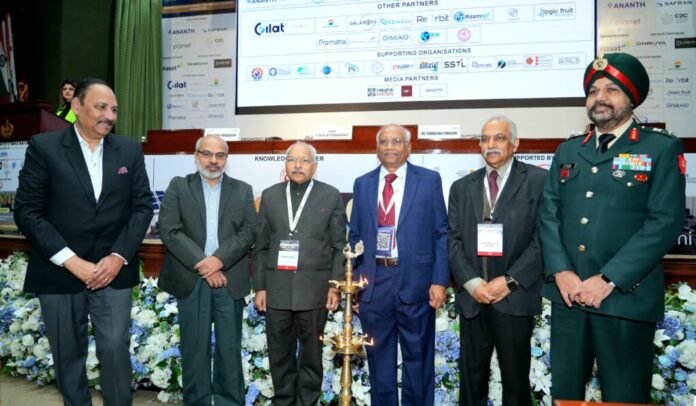New Delhi: The strategic table-top exercise IndSpaceX 3.0 addressing the degree of severities including the 4 Ds’ – Disrupt, Deny, Degrade and Destroy along with Information War-Delay and Information War-Deceive, simulated a contest between two notional spacefaring adversaries vying for dominance at the DefSat 2025.
Emphasised Lt Gen V G Khandare, “In a turbulent world dominated by Western supremacy, countries like India cannot rely on the mercy of global powers. Initiatives like G20 and BRICS are steps forward, but true self-reliance — Aatmanirbharta — requires every ministry to adopt it, not just the Ministry of Defence. Building our own strength is the only path to becoming a global power.”
Chaired by Principal Advisor to the Ministry of Defence Lt Gen V G Khandare, the simulation had “Green Land” and “Orange Land” teams developing strategies for achieving operational space superiority amid scenarios involving information warfare, system disruptions, and resilience-building tactics. The exercise was conducted by Lt Gen PJS Pannu, Senior Advisor to SIA-India. Dr Subrata Rakshit, Director General (TM) of DRDO, served as the Technical Umpire, while Dr Ranjana Kaul, Partner at Dua Associates, contributed as an Umpire.
During DefSat 2025, two significant reports — PRISM: 1.0: US-India Export Controls Dialogue and India-Africa Space Collaboration: Unlocking Strategic Opportunities for Growth were released. These reports underscore India’s growing role as a strategic leader in space and defence collaboration.
Held in November 2024, the Perspectives on Regulatory Issues in Strategic Markets (PRISM) 1.0 webinar, discussed significant policy reforms, including liberalisations in ITAR (International Traffic in Arms Regulations) and MTCR (Missile Technology Control Regime), which are poised to strengthen US-India collaboration in defence and space sectors. SIA-India, in collaboration with the IndUS Tech Council, continues the webinar series with other strategic markets like Australia, Japan, and Germany.
Director General of SIA-India, Anil Prakash, stated, “By navigating global regulatory landscapes and fostering international collaborations, India is poised to emerge as a powerhouse in defence and space manufacturing. The PRISM series and India-Africa partnerships exemplify the synergy between innovation and policy alignment, unlocking new avenues for sustainable growth and technological leadership.”
Highlighting India’s advancements in space technology and Africa’s growing ambitions, the report on “India-Africa Space Collaboration: Unlocking Strategic Opportunities for Growth” underscores how collaborative efforts in satellite technology, Earth observation, and capacity building can address global challenges like climate change, food security, and connectivity.
The report celebrates the enduring partnership between India and Africa, emphasising their shared vision to leverage space technology for socio-economic development. In this endeavour, a memorandum of understanding (MoU) between SIA-India and Ghana Space Science and Technology Institute, signed in December 2024, signals a new era for India-Africa partnerships in space technology.
SIA-India President and CMD Ananth Technologies, Dr Subba Rao Pavuluri, addressing the growing importance of space technology, remarked, “The government’s strategic initiatives are reinforcing the Aatmanirbharta vision. India plans to expand its military satellite capabilities significantly, targeting around 100 military satellites by 2030. This expansion is essential for ensuring robust communication and surveillance capabilities to safeguard national interests. Furthermore, with ₹25,000 crore allocated for defence space investments in the fiscal year 2024-25, India is making an unprecedented commitment to the defence space domain, ensuring a robust and resilient ecosystem.”
Reaffirming India’s strategic commitment to advancing its defence space capabilities and fostering global partnerships, the successful execution of IndSpaceX 3.0 at DefSat 2025 was remarkable. With pivotal policy dialogues and key international collaborations, India has further cemented its role as a leading player in the global space landscape. These partnerships will unlock transformative opportunities for technological innovation, resilience, and sustainable growth in the defence space sector, as they progress towards maturity.
Raksha Anirveda's editorial desk team brings in the collective experience of creative professionals - a fine mix of senior copy editors, writers, proofreaders and designers. Working as a team, they continuously create, manage, and curate content to sustain the magazine's profile and reputation in line with market trends and achieve magazine's goal.









